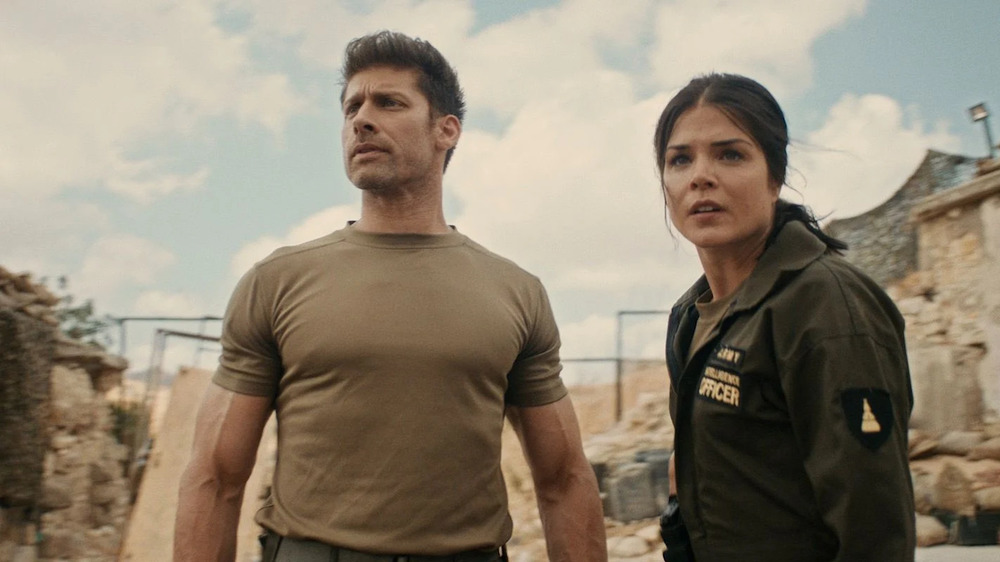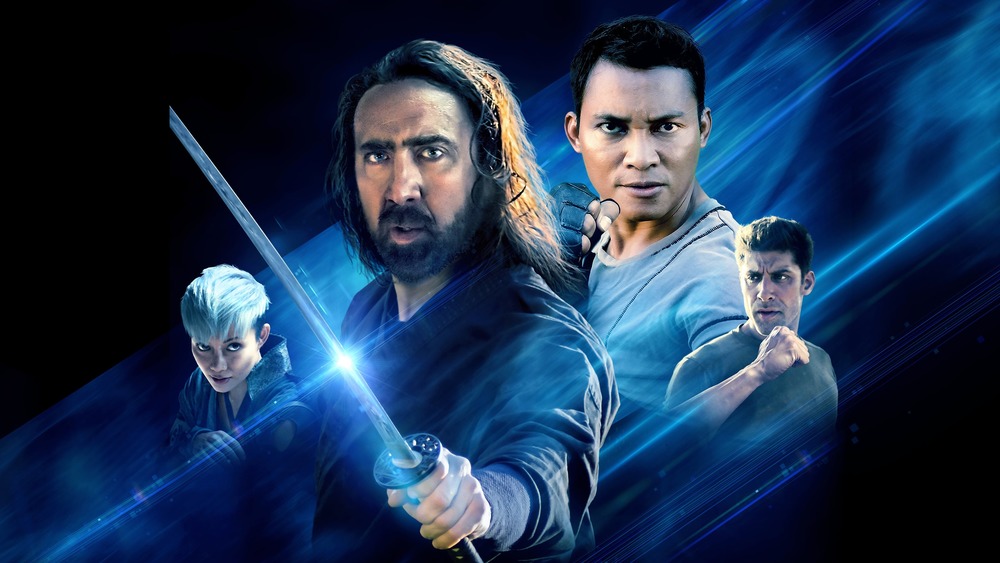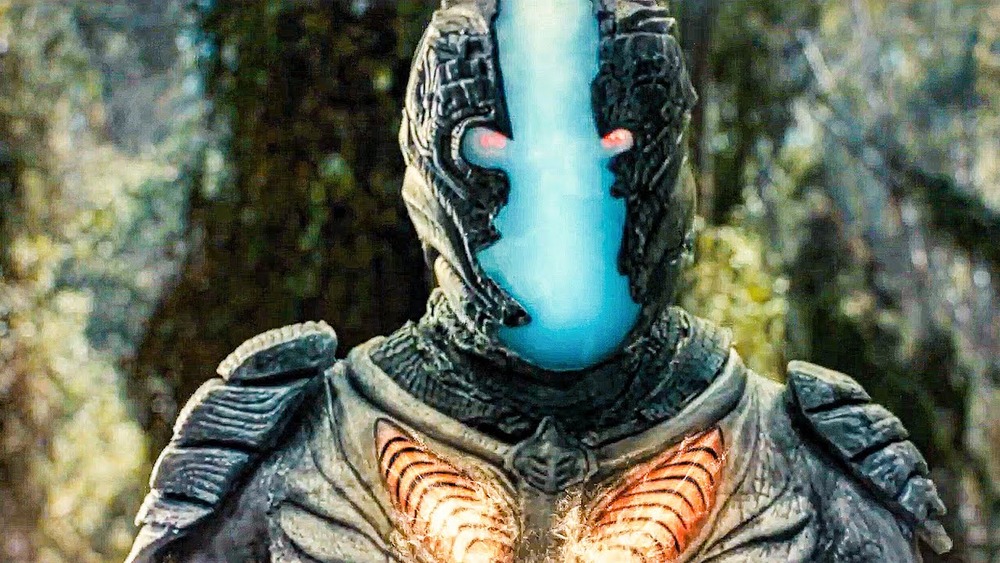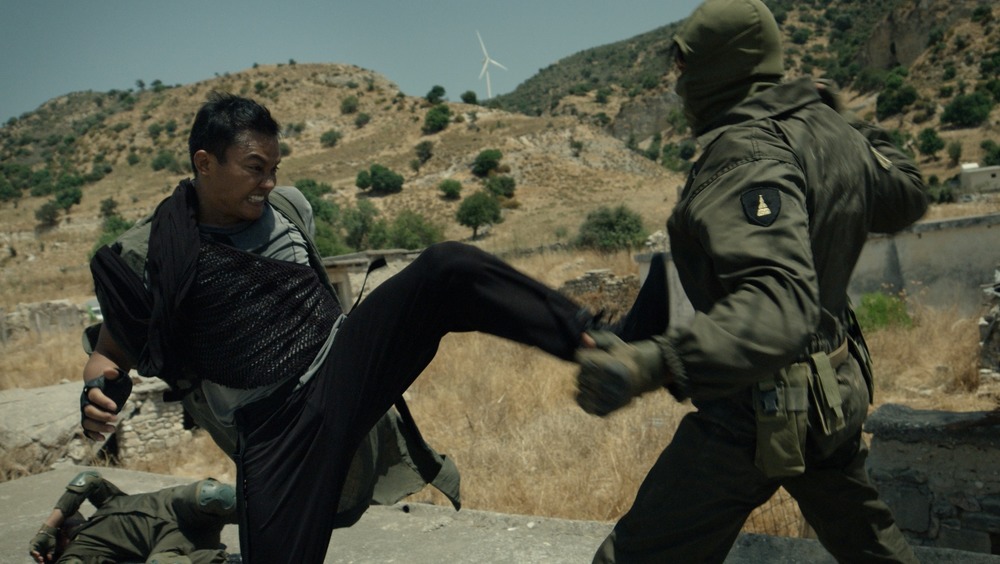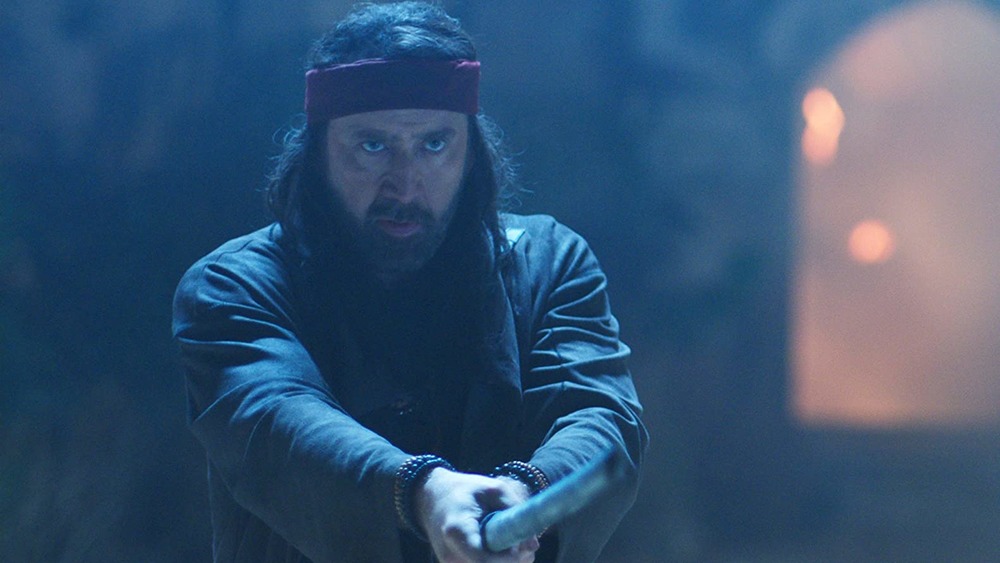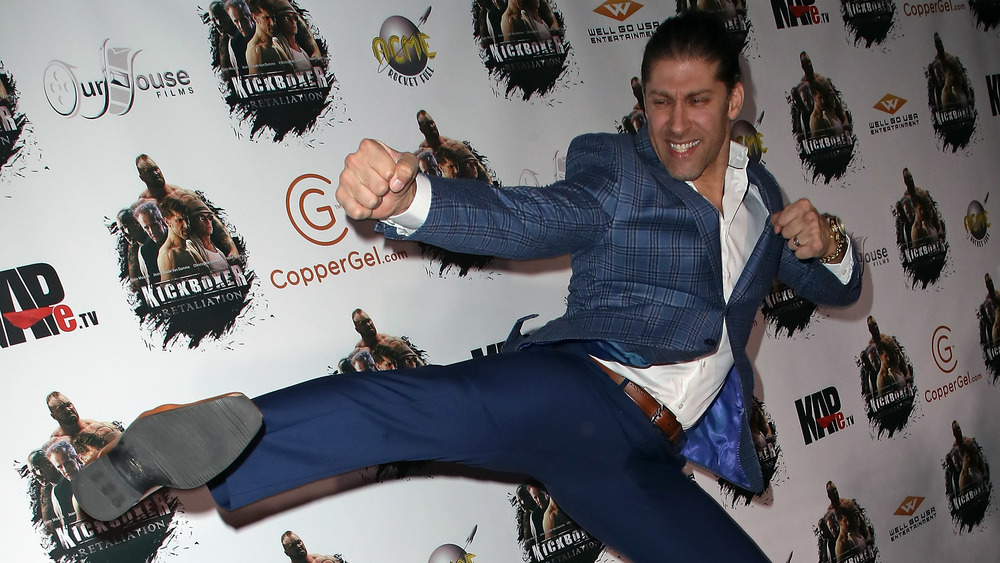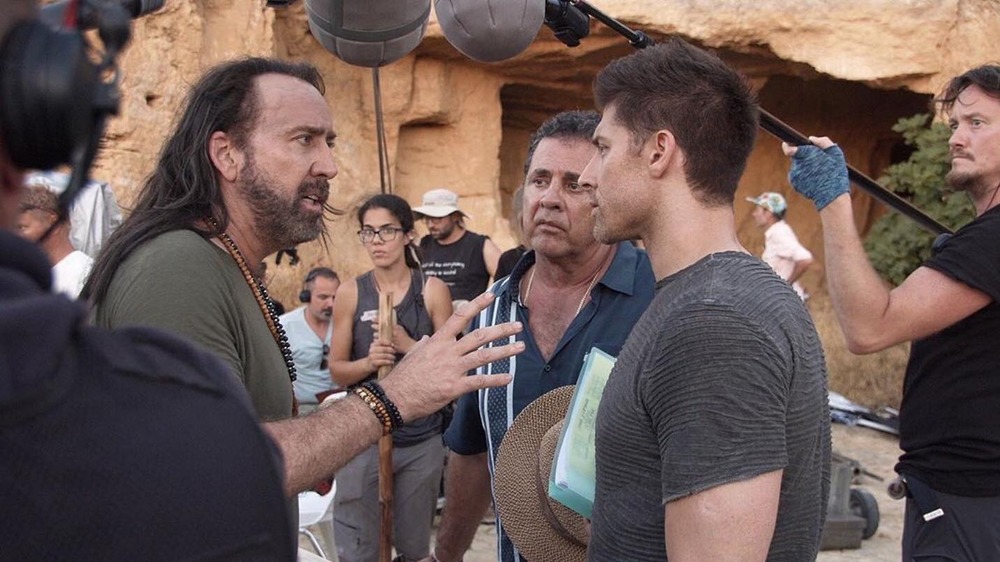Jiu Jitsu's Alain Moussi Talks Nicolas Cage, Alien Martial Arts, And The Scariest Stunt He's Ever Performed - Exclusive Interview
Imagine if you took the DNA of Predator, Kickboxer, and some of Nicolas Cage's more over-the-top performances and mixed them all together with a dash of casting that includes the likes of action movie legend Tony Jaa and Marvel Cinematic Universe alum Frank Grillo. If that sounds tantalizing to you, then you'd most likely be into Jiu Jitsu. The recently released martial arts-slash-sci-fi action flick offers up the story of an alien warrior who visits Earth over centuries in search of a challenge through personal combat, and the team of fighters assembled to stop him.
At the front of that vanguard is Jake, played by stunt performer-turned-actor Alain Moussi. A veteran fall guy who has doubled for the likes of Hugh Jackman and Travis Fimmel, Moussi has been making inroads in the acting world lately, starring in the resurrected Kickboxer franchise and even appearing (uncredited, but still impressive) as Batman in an episode of Titans. In Jiu Jitsu, he not only comes to blows with the evil alien Brax, but also gets the opportunity to act opposite Academy Award-winner Cage.
To find out what those experiences were like, we sat down with Moussi prior to Jiu Jitsu's release to talk about what he learned from his veteran scene partner, how the movie's slam-bang action was brought to life, and what makes someone a great stunt performer.
Alain Moussi enters the Jiu Jitsu ring
Can you talk a little bit about how you came to be involved in this project and what drew you to it?
Well, I've known Dimitri Logothetis, the director and producer and writer, for about ten years now. We met in 2011 in Montreal on a project there. He ended up casting me in Kickboxer: Vengeance, and then we did Kickboxer: Retaliation, the sequel. Then we were about to do the third Kickboxer when he called me and said, "Hey, Alain. Listen, we're going to shelve Kickboxer for a little while because I just got word that the markets are looking for martial arts action sci-fi." I said, "Well, that's kind of specific." He laughed, and he said, "Yeah. No, they're looking for action sci-fi, and I really want to do an action sci-fi." I'm like, "Okay. Cool. I'm down. Let's do it."
He came back about two weeks later with a synopsis and a treatment for Jiu Jitsu. I saw the title for the first time — it was Jiu Jitsu. I'm thinking, "Jiu Jitsu? What?" Then I read it, and I thought, "Oh my God. This is amazing." It was so awesome. It looked so cool. Once he showed me where it was, I was on board no matter what, because it's Dimitri. I trust him, and he's an amazing director. He's an amazing filmmaker. Anything that Dimitri says he wants me involved in, I'm down right away. This is our third project together, and I trust him wholeheartedly as a filmmaker.
You've done a lot of stunts and martial arts work over your time in acting in Hollywood. What unique challenges did this film bring with it?
I do all of my own stunts in these films. While I do have a stunt double on set — we have two for insurance purposes, but then even when somebody says, "Well, Alain, we can have Max do it," I say, "Nope, that's not happening. I'm going to do it myself. I'll do it safely, don't worry." In this one, there were a lot of stunts going on, from falling down in a cave at about 30 feet to jumping off a cliff into the sea to tons of different, cool wire stunts that we did as well, and me being slammed from one side to the other by our villain, Brax.
It definitely was quite challenging because we're doing so much of it, and I have to make sure that no matter what happens, I don't get hurt, because then we can't shoot. I'm doing action almost every day on this film. That's the biggest challenge, to make sure that we do it safely and we do it at the right time of the day as well, because you don't want to do this when you're super tired. You want to do it when you're fresh and then keep on going. But otherwise, I stay ready to make sure that my body can take it.
How about creatively? Was it a dialogue between those of you who were acting in the film, especially with some experience, and the fight team in terms of coming up with some of the crazy action in this movie?
Yeah. For me, when we design action, you have to tell the story in the action. Ultimately, that's what you want to do. The approach on this film was interesting because my background is Japanese jiu-jitsu. That's my first martial art that I learned. Then I did some Brazilian jiu-jitsu as well later on. I really wanted to include all the elements of jiu-jitsu in this film, not just Brazilian jiu-jitsu, which is very modern, but even going back in time to Japanese jiu-jitsu, even in samurai arts where it comes from. When Dimitri explained to me what the premise was, what he wanted to do with jiu-jitsu in this film as far as stylistically, I really wanted to make sure that we told the right story through the action. I definitely think we succeeded in doing that.
Jiu Jitsu and the alien martial arts
It's interesting that by setting up the alien as the originator of jiu-jitsu, it makes sense for his fighting style to reflect that style in a certain way. But was there any dialogue or talk about creating a unique fighting style for an alien specifically?
Well, we wanted him to be the originator. For us, it was about saying, "Okay. What if we were able to go back in time, where we don't really know the exact origin of jiu-jitsu?" If we go back thousands of years, a lot of these Oriental martial arts started in India, then went through China and Japan, and evolved. For us, we thought, "Okay, well, if we were to take this alien and plug him into a time in this development, this evolution, where would we plug him? Then as an alien coming back every six years... because that's the story, that he comes back to Earth all the time. Why would he come back? Is it because he wants to take over the Earth? Well, he would've done that already, I guess, or his race would have done that already if they wanted to do that."
We talked with Dimitri and talked amongst ourselves with the stunt team and our cast as well, and came up with the idea that if he was to come, it would be to see how this fighting style has evolved and then possibly try to steal whatever new people come up with for himself. When he comes to Earth, he's at our level, but really, he can do so much more, but he wants to see what we're going to do with it and how we're going to evolve with jiu-jitsu itself. We had that dialogue, we had that approach, and then within the film, what's cool is that you see Brax escalate. He goes from fighting one way at the beginning to escalating in his fighting style, meaning he seems to get stronger. He seems to get faster. He seems to just be able to do more as the film progresses because we're only giving him that ability as he evolved in the film with it, with the characters he meets, which is cool.
Brax not only influencing what we do on Earth, but also taking influence from the way it had developed between the times he was there is an interesting twist.
Exactly. Then if you look at the characters, between Tony Jaa, Nicolas Cage, you have Frank Grillo's character as well, JuJu Chan, all the martial arts characters that are in the jiu-jitsu team, each one is a martial artist to begin with. What we wanted to do was take whatever style they're proficient in... Tony Jaa, for example, it's Thai, and he can do so much more, but we wanted to say, "Okay. Well let's say we took jiu-jitsu, which originally had striking, gripping, throwing, grappling, weapons work. Now Tony Jaa does all this, but in a different style, in a Thai style. Now, what if we took that and gave it the jiu-jitsu twist? How about we took Frank Grillo's fighting style and we give it the jiu-jitsu twist?" because the beauty of martial arts is that you make it your own.
Once you evolve in martial arts, once you advance, what you find is that you're no longer just constricted by a very specific way of doing things. You tend to make it your own, and you tend to evolve in it. That's why you have martial artists such as Bruce Lee that eventually become Bruce Lee, because they've evolved through martial arts and then made it their own. We wanted that in these characters.
Bringing Jiu Jitsu's bonkers action to life
One of the more interesting moments in the movie is the escape sequence that happens at the beginning of the film. It's all shot, or primarily shot, in a first-person view. Can you talk a bit about shooting that sequence, what that was like, and how it challenged you in different ways than other stuff you might've done before?
Yeah, that was cool. That's our DP. He was inspired by a film he saw in the first person, and he talked to me about it. He said, "I have this idea for the escape scene. What do you think about that?" I said, "Dude, that is awesome." It was interesting because we had it going from first person to me popping out of the camera and the camera becoming the observer to back into first person, and we needed to be able to have somebody with a camera rig that would follow the action and give me the ability to pop out and pop back in.
One of our stunt team members, Max Avaria, he had the camera rigged on him, and our Thai stunt coordinator, Jim, he's the one that designed the entire sequence. He walked us through it, what he was thinking and how he would want it to have it designed, where we would pop out, where we'd pop back in, and we went for it. I thought it was a great choice. Every time you see an action sequence in a film, you want it to be different. You don't want the audience to repeat the same thing over and over again. You want them to have something new. I thought that was a great way to do it.
Then the challenge was, with the person holding the camera, because it's a big rig, how will that person be able to move, how to follow Tony and his action while he's moving, while he's on the ledge, jumping off the ledge, all that kind of stuff? That was challenging on its own. We had limited time to do it. We had to make choices in the way we were going to do the sequence in order to get it done the right way. I think that was a challenge, to really pick the frame rate, pick exactly the look we wanted for it, and to make the sequence fun, cool, exciting, but not overly complicated, which would take too long to shoot. I think we definitely succeeded in doing that.
Was that a difficult thing for you as a performer in terms of being used to executing a fight in a certain way on camera? Here, you're doing it where you're fighting, and you're jumping out of frame, and you're jumping back in. Was that particularly difficult?
Well, to be honest, not as much as you would think. That might sound weird, but I've done a lot of one-ers. Before I did film, I was a stage performer. I did fight scenes on stage, so you're doing three minutes of non-stop of fighting, martial arts demonstrations. To do the idea of a one-er, I already did that, and I'm practiced at doing it. I'm trained. Here, it was adding the aspect of timing and being at the right place at the right time. That was the bigger challenge, I guess, in this particular sequence. But once we rehearsed it a few times, it was really smooth. Our stunt team is world-class. Max, who was holding the camera, was fantastic. He was always on point, no matter what. Tony is always on point. He's amazing. He's an amazing performer as well. I think because we had the right talent involved in the sequence, it made it much smoother as a process.
This may be a difficult question given how much action there actually is in the film, but do you have a favorite moment or beat from the movie that you go back to?
Favorite moment? There were so many cool moments in this film. Obviously, the opening fight I have with Nic Cage is definitely one of my favorites, just because I was with Nic Cage. That was the first time I've ever worked with him, and I've been a fan of Nic since I was a kid. Definitely, that was lots of fun to do with him. Yeah. I like going back to that scene. I revisit it, and I put myself back in the cave as we were doing it. I thought that was really cool. But then the end sequence, obviously, I really love the end sequence. It's funny because the way we shoot it, it's not exactly the way that it appeared in the movie in terms of the order of things.
A lot of the stunt beats in there that I really enjoy, especially the one in which Brax puts the spear under my leg, he's tossing me in the air, and I'm flipping and smash through a table — that was really cool. That was a fun one to do. There's also a cool double twist, when we're both in the air, twisting together, and that was another challenging stunt to do. I thought that was really cool.
I guess maybe one more moment that I really liked is, there's a fight in the interrogation room, and there's a move that I love to do. It's a "Webster." You go backwards. It's like doing a front flip but going backwards, and you kick your heel up. I got it on the first try, which I was really happy about because you never know... Sometimes they don't go exactly the way you want. Anyways, at that moment, when I landed, boom, I was like, "Yes, I got it." That was fun.
You have to make sure you don't celebrate before they call cut though, right?
No, man. I landed on my butt so many times. It happens. You're there, and you practice. You practice on mats and stuff. It's a whole other story when you end up on a concrete floor with big boots on, and all the elements change. As proficient as I am at doing it, whenever you're doing acrobatics, it's never an exact science. You try to make it as exact as possible, but sometimes there's a little part of me that says, "Hopefully I land it this time." I did, so I was happy. I was quite happy.
Alain Moussi on working with the force of nature that is Nicolas Cage
Let's talk about Nicolas Cage. Obviously, you got a lot of time with him on screen. You got the big fight scene. What is it like sharing scenes with him both as an actor and from the action standpoint?
Well, as an actor, I was there trying to absorb all of his experience, anything I could see him do. That was the number one thing. I'm going to be on set with this veteran actor, who I think is amazing, an Academy Award winner. Anything that I can observe him doing, I'd love to steal that from him in terms of [making] myself still evolve and become better.
What I found with Nic that was so inspiring is the fact that, after such an incredible career that is still going, by the way, very strong, he is so passionate about his craft. He's so generous as an actor. I thought that was really cool. He didn't come in there just saying, "Hey, I'm Nic Cage, I'm doing my thing and then I'm going to be off. If I'm not on screen, I'm not there."
No, no, no, man. He was there every step of the way. From the moment he stepped into rehearsal, he wanted to be there. He wanted to run scenes. He wants to run everything the way it was going to be on set just because he wanted to practice. He wanted to make sure his mind was in the right place. Then on set, he was always the one that said, "Okay, let's rehearse this. Let's do it. Let's feel it out together." I thought that was so cool because he didn't have to do that. I consider myself a total rookie when it comes to acting, but he was always the first one to say, "Hey, let's do this together. We're collaborating. We're going to be a team." He came in with that energy, which was really cool. Every moment on set with Nick was awesome, was fun, and he just wanted to do the movie justice and do a great job. That was very inspiring to me.
Then there's the action. When you talk about the action, obviously, that's something that I've been doing for a long time. When we first started, we didn't have a lot of rehearsal time with Nick. We showed him the first sequence, and he really wanted to rehearse it. Then he asked, "Guys, is it okay if we come in during the weekend together and rehearse some more? I know it's your weekend, but would you be okay with that?" We said, "Of course." Every day, we rehearsed for three or four hours with him. It was lots of fun. He was diligent. He wanted to be as good as possible to shoot the scenes. I remember when we did our fight, obviously, he had a stunt double on set as well, but he came in, in the morning when his stunt double was doing some stuff, and watched the whole thing in the tent with Dimitri.
He wanted to be there the whole time. When it was his turn to do his action, which he did tons of it ... more than I would have ever expected him to do, but he did tons of it. He wanted to be good at it. He really wanted to go and understand what was going on in order for him to deliver his own performance after, which I thought was really cool.
It was also cool to do some action directing with Nic Cage. He said, "Alain, if you see the playback and it's not as good as you want it to be, I will do it as many times as I need to do to make it great." Sometimes it was one take, two takes, three takes, four... like, "Nic, man, 80%, 90%, but I think we can go get more." He always said, "Okay. I'm doing it again," right away, and he would want to do it again. I thought that was fantastic. It was amazing. He was very committed.
Was there anything specific that he brought to the table in the acting side that changed a scene or changed something about the way that you approached working within a scene, creatively speaking?
Yeah. Nic is like... I think the right analogy for me is a pro fighter, or a pro martial artist. When you're a martial artist, you don't even think about movement because the movements come on their own. You know the choreography. You know it so well that you can now act and be free within the choreography. That's how I saw him doing his craft, doing acting, and that's how I want to be when I act. I don't want to think about anything other than just being right there in the moment. What I found is that as we shot scenes, new stuff would pop, nuances would pop all the time that I could play off of, and he would just bring something new.
Then he and Dimitri started bouncing ideas. That was amazing to see, too, the way he was able to take a piece of direction from Dimitri. All of a sudden, he took that and did something brand new and cool with it, especially his mannerism and the way he expressed himself as Wylie, which became, I don't know, wild. It's almost like getting a touch of some of the characters he's done in the past, but none of the characters he's done in past. He took that and made it something brand new.
I learned a lot just watching him do that, and the way him and Dimitri interacted. Dimitri's an amazing director. What's beautiful about the way I saw him be with Nic is he would give great direction, and then he would give Nic full freedom, like, "Listen, Nic. Blah, blah. Here's what I'm thinking," It's like he said just the right thing to spark Nic, and then Nic would just do something amazing. It was like, "What?" That's what I thought was so cool, the freedom that Nic was able to have while he acts. I've seen other actors like that, obviously. I've shot with a lot of people, but never with me that way. I was in the scene with him. I thought that was so cool.
As you mentioned, you've been doing a lot of stunt work, and you're newer on the acting side, but who is an actor in Hollywood who you've worked with who you think would make a great stunt performer in terms of their comfort in their body and how they handle the action side of things?
Hugh Jackman, I've worked with Hugh Jackman, and Hugh Jackman is amazing. Also, Travis Fimmel on Warcraft. I worked with him, and he was fantastic.
There are two different things when you double somebody: There are the stunts, and there are the fights. The fights, especially when you're the hero, well, at that point, you're winning a lot. To do the fights and the movements, a lot of actors I've worked with are very proficient. When it comes to the stunts and the falls and that kind of stuff, that's something different. That's a whole art of its own, to take the falls, take the hits.
I think Travis and Hugh are amazing as the hero. When we were there, when I worked with Hugh, he was playing the hero the whole time. But another one that I did was this cool fight scene with Channing Tatum in White House Down. I was doubling the bad guy. We did the fight scene in front of the White House. Channing was awesome. I told him, "Listen, be comfortable to do positive contact on the body. Let's make this really cool, but feel free to go hard."
He looked at me and paused, then said, "You'd better go as hard as I go, man." We just went balls to the wall. It was an awesome scene. He took hits. He took falls. I took him and I tossed him over my shoulder onto a glass surface. He just took it. I was very impressed with that. That was a big bump, and he just took it. The next day, he said, "I ain't doing that again."
Alain Moussi on what makes for good stunt work and the comics character he dreams of playing
You come to this industry from the martial arts world, and with a lot of martial arts training. Other than something like that, what's one skill that you'd say someone who wants to get into the type of work that you do should have?
It's a mix of things. Action filmmaking is huge. There are so many skills to develop, but if you start with stunt work, I think something that newcomers in the stunt industry sometimes forget is that you're not playing the hero most of the time. Most of the time, you're the one playing the guy getting beat up. You're Body Guard Number Three. You're Punch Man Number Four. That's the guy who comes in, and you get shot in the head, and you fall, or you get hit with a baseball bat and you fall flat back on your back, and you do that 12 times. You're not just throwing kicks and punches at people, winning. I find that sometimes people think they're going to play the hero, so they focus so much on the skills, the martial arts acrobatics, that kind of stuff, but they forget that you're going to be taking hits a lot.
Then, when it comes to all the hits, they're shy about it, which is the completely wrong approach, because most of the time, that's what you're going to play. If I were to recommend anything, the skillset you want to build is really being able to do great falls and knowing how to take reaction. The simplest stuff sometimes is what you're going to do most of the time. That's the bread and butter. Then, obviously, build up the striking skills, the grappling skills, and the acrobatic skills as well, as much as possible, but you really got to have the approach that you're going to come in there as a bad guy. You're going to be a ninja. You're not going to be famous. You're going to be out there in the shadows, taking the hits, and not necessarily get the recognition for it. That's what the job is.
What coordinators love the most is, they want somebody that's cool, that they want to hang around on set. They want somebody skilled, but they also want someone that's cool to hang out with, because they're going to be around the whole team for a while. They want to work with good people. You have to make sure that you stay humble and have the right attitude to be on set.
I think another thing that people forget is that as a stunt performer, you're an actor. You're playing a part. You're a character. You're not just out there to fall. You're a bodyguard, so what does a bodyguard so? I think that's one thing that was stressed when I first started my stunt career, was you should take acting classes right away, because you're doing physical acting. That's what stunts is — it's physical acting. It's not just falling. You're playing a character.
Even when you double, when you're doubling, you're actually imitating. You're imitating another actor. If I'm doubling Hugh Jackman one day or I'm doubling Jai Courtney, well, I have to understand what his mannerisms are. I'm playing Jai playing whatever character he's playing — Captain Boomerang, for example. You have to have an eye for that, because you are acting the whole time.
You've done work on several comic book movies, like Shazam! and Suicide Squad. Are you a fan of the genre? Is there a title out there that you would really love to work on if it were made into a film?
Oh man, I'm a big fan of the genre. I've watched every superhero movie. Some I like better than others. I guess my favorite Marvel movie for the action, let's say, was Captain America: Winter Soldier. That was my favorite for sure, but one of my favorite characters is Batman, because he's very physical. There's a character they haven't done anything with yet that I would love to get a shot at if ever it does happen. It's the Red Hood. I think that's a really cool character. What's cool is that he's such a physical character, but it's not a delicate physical character. He's a rough physical character, which I like because obviously it's Robin who became the Red Hood. I think it'd be a very cool character to play.
Making it look brutal as opposed to a dance a lot of the time would be an interesting take on the Red Hood.
Yeah, I think it'd be fun to do. I think it's a good combination of action and acting for the character itself. Personally, when I do fights, I really like fights that feel real. That's why I like positive contact. If I'm doing a fight with somebody else, I will have them make contact. It has to happen because if I don't feel it, when I see it, it doesn't work for me. I feel like for the Red Hood, it would be this thing where he comes in and doesn't do choreography. He just beats people up. It would be a really cool approach. It would translate to really cool fights and cool action, and also a very complex character. I think it'd be a fun one to play. Hopefully somebody reads about it, and they say, "Hey, that might be a good idea."
Alain Moussi's most dangerous stunts
As a final wrap-up question here, you've done so much work in stunts and action movies. What's the craziest stunt that you've ever had to do?
There are two, which were dangerous for different reasons. The first one was on White House Down, when I had to fall through a glass roof 25 feet. I was suspended 25 feet above the ground. We free-fell through a glass roof, and then through a table and right to the ground with no mats.
We were on a wire system and we had a slight decel in the middle, so maybe two feet of decel, just to say we're taking some of the edge off when we hit the ground, but we were literally falling 25 feet through glass, through a table to the ground. We bounced off the ground. We did one take, four cameras. We were both okay, but man, I was scared. When I was on top there and they asked me to pull the pin off the system, I pulled the pin, threw it on the side, and I'm like, "Oof." My heart was beating so hard. Then we did it, bang, and everything was okay. Both me and Johnny were all good, but that was a nerve-wracking one. That was a tough one.
Would you say that, generally speaking, big falls are the most complicated and difficult things to do?
It's one of them. On Shazam!, it was a wire through glass. Any time you have glass, any time you have big falls, it's always nerve-wracking. For me, I think I use nerves the right way. If I'm not nervous, I feel like I'm not going to be at my best. I have to have that adrenaline because then I'm so focused. I'm looking at everything. I'm very aware of my surroundings, of everything that's happening. I'm aware of my body. I find that when I feel those nerves, it becomes heavy-duty adrenaline, and I'm always at my best, but definitely it starts with a bit of fear. Any stunt man that says he's never afraid, I'm thinking, "Come on. Stop." There is a level of fear, but then it's the way you use it, I think. The more experience you have, the more you control it, because you've been there before.
Then, we did this concept for the Cirque du Soleil a few years back. There was this fall I was doing off a tower. It was about 30 feet, 35 feet. I had to do this fall on fire, and my whole backside was a big flame. We were on top of the tower, and this whole choreography, it was a live show for five minutes. I had to run from the bottom. In the back, there was a stairs system. I went all the way up, and they put all this stuff on me. I had the gel on, and everything was ready to go.
I'm just kind of wavering. My whole back, I have this huge flame above my head, and then she just sends me off the tower, and I go face first and then last second, twist and fall on mats and boxes, and boom. Then I had to turn to get extinguished, so there were a lot of moving parts, a lot of elements. It was one of the highest falls I had done, and it's on full flame. It was interesting. I was quite nervous. My girlfriend now says, "You're not allowed to do fire anymore. That's it, you're done. No more. You're an actor. If you want to do crazy stuff, that's fine, but there's no fire. You're not allowed to do that."
Any stunt you do, if you add, "And I'm on fire," that has to be a whole other level of difficulty.
Man, it's a whole other level. There's a lot of rehearsal. You have to trust your team. We had an amazing, amazing safety team and a fire team. We rehearsed so much. We rehearsed in every possible way. I was in good hands, and I knew it was going to go well, but still, when you get lit and you feel the heat, you're like, "Whoa, this is gnarly. I'm on fire."
